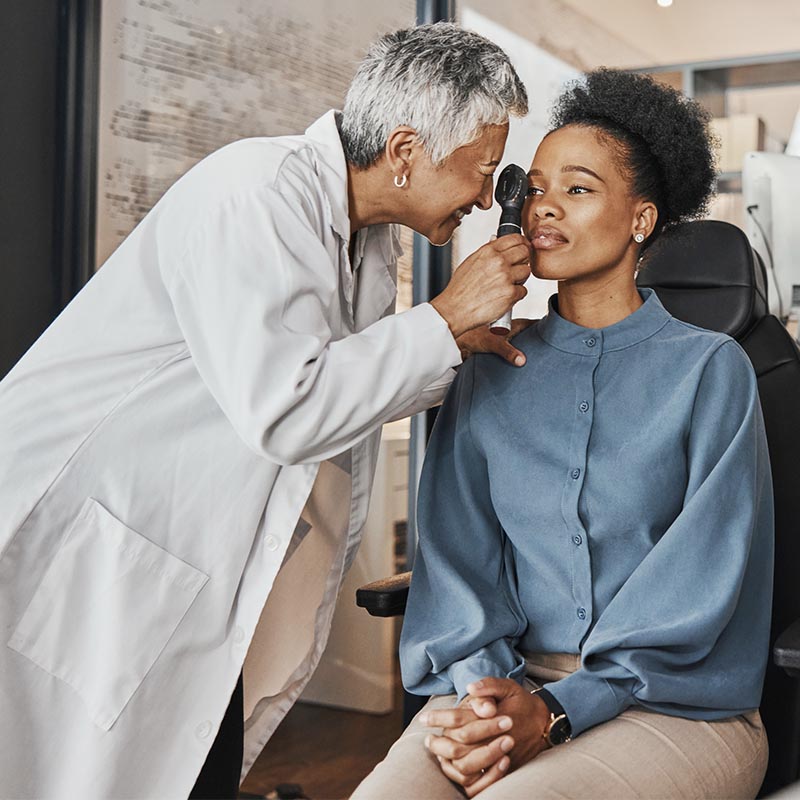At Rocky Mountain University Eye Institute, our comprehensive eye exams go far beyond checking how well you see. These exams help detect early signs of eye conditions and overall health issues—often before symptoms appear—giving you peace of mind and a clearer path to lifelong vision health.
Comprehensive Eye Exams
Your Eyes Deserve More Than Just a Vision Test



Introduction to Comprehensive Eye Exams
-
Detects eye diseases early, like glaucoma, cataracts, and macular degeneration
-
Evaluate signs of systemic health issues such as diabetes and high blood pressure
-
Includes personalized vision correction for nearsightedness, farsightedness, and more
-
Supports long-term eye health for patients of all ages
What to Expect During a Comprehensive Eye Exam
A Thorough Look at Vision and Eye Health
Our eye exams are designed to be both thorough and comfortable. We begin by reviewing your medical history and current vision needs. You’ll undergo a series of tests to evaluate your visual acuity, eye movement, depth perception, and more. We examine both the external and internal structures of the eye using advanced diagnostic technology. These insights help us detect and manage conditions like cataracts, glaucoma, or diabetic eye disease—often before symptoms develop.
Is a Comprehensive Eye Exam Right for You?
Eye Care for Every Stage of Life
Everyone can benefit from regular eye exams, whether you’re a college student in Provo, a parent in Lehi, or enjoying retirement in Saratoga Springs. Eye exams are especially important for:
-
Children needing clear vision to support learning and development
-
Adults managing screen time, job demands, or driving at night
-
Seniors monitoring age-related changes in vision
-
Anyone with a family history of eye disease or chronic health conditions
Why Choose RMU Eye Institute for Your Eye Exam?
Clarity Today. Health for Tomorrow.
By choosing Rocky Mountain University Eye Institute, you’re investing in your vision and your overall well-being. Our detailed exams empower early detection, personalized care plans, and proactive management of any eye or health concerns. With a patient-first approach and expert clinical team, we’re here to support your clearest, healthiest vision—no matter your age or stage of life.
Frequently Asked Questions
What is included in a comprehensive eye exam?
A comprehensive eye exam typically includes a review of your medical and vision history, vision testing (such as visual acuity and refraction), eye muscle and movement testing, internal and external eye health evaluations, and screening for eye diseases like glaucoma, cataracts, and macular degeneration.
How often should I get a comprehensive eye exam?
For most adults, it’s recommended to have a comprehensive eye exam every 1 to 2 years. Children, seniors, and people with certain risk factors—such as diabetes, high blood pressure, or a family history of eye disease—may need more frequent check-ups.
What's the difference between a vision screening and a comprehensive eye exam?
A vision screening is a quick test that checks for basic vision problems, often done at schools or health fairs. A comprehensive eye exam is a detailed evaluation performed by an eye care professional to assess overall eye health and detect potential issues early.
Can a comprehensive eye exam detect other health problems?
Yes! During a comprehensive eye exam, eye doctors can detect signs of systemic health conditions like diabetes, high blood pressure, high cholesterol, and even certain types of cancer, by observing changes in blood vessels and other structures in the eye.
How long does a comprehensive eye exam take?
A typical comprehensive eye exam takes about 45 minutes to an hour, depending on your individual needs and whether any additional testing is required.
Do I need a comprehensive eye exam if I have perfect vision?
Yes! Even if you see clearly, regular eye exams are important for maintaining eye health and detecting silent conditions like glaucoma or early macular degeneration that may not show symptoms right away.

